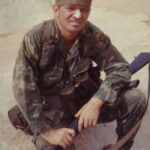2021 Honoree
U.S. Army
Vietnam
Major Mike Perkins joined the Army to be a paratrooper. After basic, he went to parachute school and joined the 101st Airborne. Later, after a year on the eastern German border, he was selected for Officer Candidate School. He graduated and spent a year with the 2d Armored Division in Texas before Special Forces training.
In 1966 Perkins made it to Vietnam for his first tour where he entered combat with a Special Forces A-Team. He worked with Marines and Project Delta, and then led Mike Force operations with Australians and Chinese along the border with North Vietnam. On his second tour, he worked some “pretty interesting operations” with the 101st Airborne and a long-range patrol company. After that, the Army sent him stateside for advanced infantry training. On his third tour, he was assigned to the 9th Infantry Division and given command of a rifle company in the Riverine Force, all draftees. Living on Navy ships, his troops performed airmobile and amphibious assaults along the Mekong Delta.
On one night raid, Perkins recalled he had a bad feeling about the landing zone where his 10-man crew was dropped. They were not on the ground five minutes before they were under attack. On the initial pickup, the helicopter crashed, rolled over, pinned Perkins in the mud, and trapped four crewmembers underneath the Huey’s tail. Only the heroic actions of the unit’s sniper saved them. Three rescue attempts later, they got off the ground. “I got chewed up bad, but we didn’t lose anybody,” Perkins said. He received the Silver Star and Purple Heart for the incident.
He spent nearly a year recovering. “I had a love-hate relationship with my physical therapist, but he got me running and jumping again,” he said. “I was back.” After Ranger training, he spent a year in Germany before volunteering for a fourth tour to Vietnam, advising Vietnamese Rangers along the Laotian border until the war ended.
Perkins worked with officers and NCOs on a regular basis, but the draftees under his command had his greatest respect. “I prayed every day, not to protect my life but for the wisdom and knowledge that I needed to keep these young men alive,” he said. “I wanted them all to go home to their mothers and their wives and their families.” Nobody was killed under his command in the 9th Division though many were wounded.
Afterwards, he spent another 13 years advising Special Forces in the U.S. and abroad until his retirement in 1985. In his 24-year career, he received numerous decorations including two Bronze Stars, the Legion of Merit, Air Medal, Vietnam’s Cross of Gallantry, parachute badges from the U.S., Vietnam, South Korea, and Greece, and the Combat Infantryman Badge.

